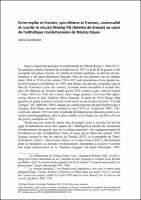Chapter Entre mythe et histoire, syncrétisme et fracture, universalité et russité: le recueil Mednyj Kit (Baleine de bronze) au coeur de l’esthétique révolutionnaire de Nikolaj Kljuev
| dc.contributor.author | Sinichkina, Daria | |
| dc.date.accessioned | 2022-06-01T12:07:09Z | |
| dc.date.available | 2022-06-01T12:07:09Z | |
| dc.date.issued | 2017 | |
| dc.identifier | ONIX_20220601_9788864535074_28 | |
| dc.identifier.issn | 2612-7679 | |
| dc.identifier.uri | https://library.oapen.org/handle/20.500.12657/55845 | |
| dc.description.abstract | Soon after greeting the February revolution, Klyuev turns to an aesthetic of violence and disruption. In the poetic cycle Medny Kit (1918), the utopia of “peasant paradise” stems from the apocalyptic destruction of old Russia. While the poet contemplates the cyclicity of Russian history, the lyrical subject comes transfigured out of the “red” baptism, identifying himself simultaneously to Rasputin and Avvakum. As the cycle captures the brutal melody of the times, the lyric genre is pushed to its limit – polyphony, which announces the transition to narrative and epic poetry. | |
| dc.language | French | |
| dc.relation.ispartofseries | Biblioteca di Studi Slavistici | |
| dc.subject.other | Mythopoetics | |
| dc.subject.other | Nikolay Klyuev | |
| dc.subject.other | revolutionary poetics | |
| dc.subject.other | epic poetry | |
| dc.subject.other | Avvakum | |
| dc.title | Chapter Entre mythe et histoire, syncrétisme et fracture, universalité et russité: le recueil Mednyj Kit (Baleine de bronze) au coeur de l’esthétique révolutionnaire de Nikolaj Kljuev | |
| dc.type | chapter | |
| oapen.identifier.doi | 10.36253/978-88-6453-507-4.18 | |
| oapen.relation.isPublishedBy | bf65d21a-78e5-4ba2-983a-dbfa90962870 | |
| oapen.relation.isbn | 9788864535074 | |
| oapen.series.number | 36 | |
| oapen.pages | 23 | |
| oapen.place.publication | Florence |

